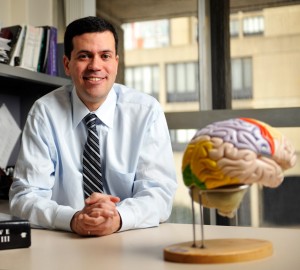Delgado ’97 Receives Presidential Early Career Award for Scientists

On Dec. 13, Mauricio Delgado ’97, assistant professor of psychology at Rutgers, was one of only 85 researchers across the country to receive the Presidential Early Career Award for Scientists and Engineers.
This is the highest honor bestowed by the United States government on science and engineering professionals in the early stages of their independent research careers. The winners are selected for their pursuit of innovative research at the frontiers of science and technology, and their commitment to community service as demonstrated through scientific leadership, public education, or community outreach.
Delgado’s research group, which is funded by a five-year grant from the National Institute on Drug Abuse, uses functional magnetic resonance imaging to investigate how the human brain learns from positive and negative reinforcers, and how this information guides decision-making. He and his group hope to further explore the ways in which potential negative outcomes influence decision-making in maladaptive ways, such as drug abuse.
The work, which is intriguing in so many real-life applications, from the psychology of addiction to the decision-making points for financial traders, has been a topic of interest for New Scientist, The Economist, Scientific American, MSN Money, BBC News and The Philadelphia Inquirer.
A neuroscience and behavior major at Wesleyan, Delgado received his master’s and doctoral degrees in neuroscience from the University of Pittsburgh. He was a post-doctoral fellow at New York University before joining Rutgers-Newark as head of the Social and Affective Neuroscience laboratory.
Wesleyan Professor John Seamon recalls Delgado as an outstanding student, even in the Introduction to Psychology course that Delgado took as a first-semester freshman.
“He wanted to get involved in research from the very beginning,” Seamon says. “I’d always had a rule that a student had to take Research Methods before I’d agree to let him or her work in the lab, but he pestered me so much that before the end of the semester I agreed; I let him in as a first year student—and he loved the work, he loved doing research. He opened my eyes as to what a truly motivated first-year student could do.” Delgado’s senior thesis, on visual cognition, became a joint publication with his mentor.
Delgado has kept in touch with Seamon and has returned to Wesleyan as a guest of the NS&B program for undergraduates interested in pursuing careers in the field. As a recent graduate, he is a role model for current students interested in a career in academia and research and he offers this advice to current Wesleyan students:
“To get anywhere you want to go, you are in a perfect place to explore: you have helpful faculty who are great mentors, interested peers, and lots of opportunities to do research,” he says, recalling his own undergraduate research as pivotal. “I arrived at Wesleyan interested in becoming a pre-med student. After taking Professor Seamon’s Introduction to Psychology class and starting a research project in his laboratory, I realized that there was this whole other potential scientific career which I frankly hadn’t considered,” he says. “I was fascinated.”
Also, the McNair Fellowship Program, at that time directed by Professor of Biology Jim Donady, further helped him understand the rigors, discipline, and rewards of pursuing graduate-level science.
While Delgado considered his research work exciting in itself, he finds it particularly satisfying to mentor the students—both graduate and undergraduate—who work with him. “I have been fortunate to have worked with some great mentors, and now I get to enjoy the other side and attempt to guide student’s lives and careers in the laboratory. Just the other week, my student and I published a paper—her first one—she was thrilled and I was so happy for her: I remembered the feeling I had when I got my first paper published with Professor Seamon.”
Also rewarding are the results, which indicate his work may have applications in addiction therapy, as well as other areas of cognitive and behavioral therapy.
“It has been a lot of fun investigating how one can use thoughts to control emotions with the goal of changing potentially risky behaviors, like drug-seeking,” he says. “It sounds very non-scientific, ‘think happy thoughts,’ but once you can show that there is a corresponding brain mechanism that is changing along with the behavior, then we can start thinking about potential applications of this research to enhance an individual’s ability to control his or her life.”

